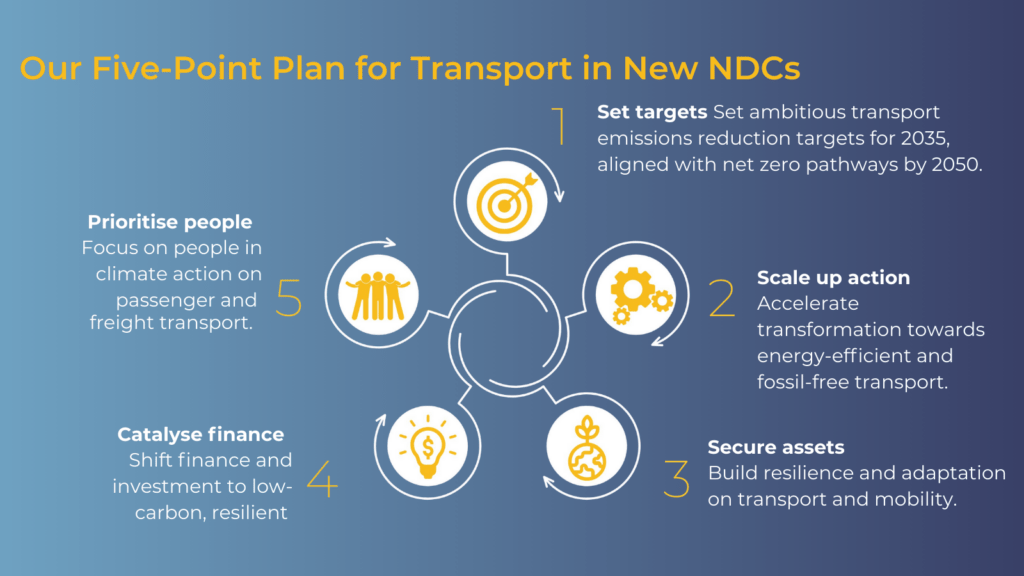27 March 2025 In Blog Post, News
Accelerating Ambition: Strengthening Transport Actions and Commitments in the Next Round of NDCs
As countries prepare the next round of Nationally Determined Contributions (NDCs) in 2025, there’s a vital opportunity to enhance climate action in the transport sector. Our Five-Point Plan for Transport in New NDCs offers guidance designed to help policymakers set impactful transport measures aligned with both national economic development, social inclusion goals and global climate objectives.
Why Do Bold Commitments in NDCs for Transport Matter?
Transport is central to everyday life, directly driving economic development and commercial activity, affecting jobs and participation in socio-economic opportunities, and enabling community resilience for people. In 2021, transport contributed approximately 7% of global GDP (around USD 6.8 trillion) and employed around 193 million people worldwide. Yet, the sector continues to face substantial sustainability challenges and is responsible for a major contribution to climate change.
In 2021, transport generated 21.9% of global CO2 emissions, making it the second-largest emitting sector. With emissions still projecting to rise, urgent action is required. According to the findings from the Intergovernmental Panel on Climate Change (IPCC), transport emissions need to be reduced by 59% by 2050 compared to 2020 levels, to achieve the Paris Agreement goal of limiting temperature increase to 1.5°C.
Furthermore, the transport systems and infrastructure are increasingly vulnerable to climate-related impacts and climate-induced natural hazards cause an estimated USD 15 billion in annual infrastructure damages. The most affected are often low- and middle-income countries, where the economic impact is greatest. This highlights the need for stronger adaptation and resilience measures worldwide.
A Plan for Stronger NDCs: Five Key Recommendations
The “Five-Point Plan for Transport in New NDCs” recommends targeted actions in five areas:

Clearly Defined Transport Emission Reduction Targets
Countries must set ambitious transport emissions targets for 2035, aligned with net-zero pathways by 2050. High-income nations, responsible for half of global transport emissions, need strong, Paris-aligned targets with clear baselines (e.g., 2010 or 2019). Medium-term goals for 2030 and targets aligned with doubling energy-efficient, fossil-free land transport by 2030 are essential.
Accelerating the Shift Toward Sustainable Transport
NDCs should drive transformation through regulatory frameworks and incentives. Policies prioritizing public transport, rail, walking, cycling, micro-mobility, and deploying zero- and low-emission vehicles across all categories are crucial. Bold domestic action in aviation and maritime transport and international ambition via the International Civil Aviation Organisation (ICAO) and the International Maritime Organisation (IMO) are needed.
Building Resilient Transport Systems
Transport resilience and adaptation must become central in NDCs, addressing climate-related disruptions through multimodal infrastructure. Adaptation measures should leverage National Adaptation Plans (NAPs) and align with sustainable development goals, strengthening links between adaptation and mitigation.
Redirecting Finance Towards Low-Carbon Solutions
NDCs must redirect finance towards resilient, low-carbon transport solutions, ending fossil fuel subsidies and internal combustion engine sales. Clearly defined unconditional and conditional financing needs, alongside technology transfer and capacity-building support, are vital.
Putting People First in Climate Action
People-centred policies in transport climate action are essential. NDCs should focus on accessibility, proximity, and reducing motorised transport reliance. Balancing technology-driven improvements with a strong “Avoid-Shift” strategy is critical, supported by policies and training for a just workforce transition.
Good Practices from New NDCs
Several countries already illustrate how such ambition can be translated to transport in their new NDC submissions of 2025:
-
- Switzerland is targeting a 41% reduction in transport emissions by 2035 and full decarbonisation by 2050.
- Singapore plans substantial expansions of its metro and cycling infrastructure, dramatically improving urban mobility.
- Lesotho has set specific adaptation targets, including climate-proofing roads and enhancing flood resilience.
- Saint Lucia is actively supporting electric vehicle infrastructure with financial incentives and infrastructure development.
- United Kingdom features dedicated activities in support of just transition for workers, communities and businesses in transport and other sectors.
Taking Action Now
Clear targets, strategic investments, resilience planning, finance shifts, and inclusive policies are essential components for achieving the Paris Agreement goals, while transforming transport.
To learn more, explore our complete recommendations in the Five-Point Plan for Transport in New NDCs, and take part in shaping bold NDCs for a more sustainable transport sector.